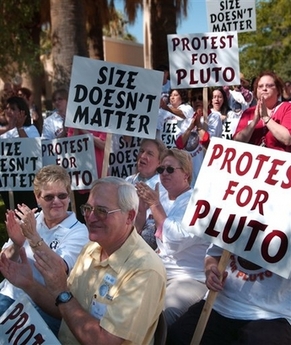For those who would like to discuss the finer points of my blog writing skills, and the deeper perhaps even sinister implications of my particular word choices, please use this earlier thread 
For everyone else, Kenneth Blumenfled has graciously gotten us back on track in a comment reproduced below. For those wanting to discuss the substantive issues associated with my earlier post, the key elements of which I reproduce below, please use this one! Thanks!
Here are some questions worth asking about the hockey stick experience that are not receiving enough attention:
1. The Chronicle article notes that the author(s) of the hockey stick article were responsible for its inclusion in the IPCC report. What are the issues associated with having people (not just limited to the HS, of course) involved with assessing their own work? This would never fly for, say, journal peer review or the drug approval process. Other experience suggests that science can be misrepresented when people review their own work in assesments for policy makers. What are the alternatives? What are the general lessons for the emapnelment of science assessment bodies?
2. The Chronicle article noted of the IPCC’s presentation of the HS, “caveats faded from view when leaders of the IPCC boiled down the 994-page scientific report into a 20-page synopsis.” Representing complex science in a sound bite necessarily requires simplification, and arguably in this case, and many others, over-simplification of the science. Such over-simplifcations are amplified by the media and used in politically convenient ways by policy advocates on all sides of an issue (as described by the Chronicle, e.g., in the use of the HS by the U.S. National Asssessment and the WSJ). Does it make sense to “boil down” science in a manner that inevitably leads to a mischaracterization of that science? What are the alternatives? This isn’t the only example where communication has suffered in the IPCC due to oversimplification of the relevant science.
In my view, both questions raised above might be addressed, at least in part, if the IPCC (or any assessment) were to ask and aswer “So what for action?” of science findings when bringing them to policy makers. The inclusion of any information in a “summary for policy makers” or a “policy relevant” document is based on an assumption that such information is in fact relevant to those policy makers. Scientists should be explcit about why, exactly, they are including some information and not others and what the criteria of relevance actually is. In the case of the IPCC, criteria of relevance are out of sight, and as far as I know completely arbitrary.
Kenneth Blumenfeld offers a reply:
Okay, I’ll take a crack at point 1. It seems that IPCC authors may have been selected based on their expertise in a given area, and the intentions were probably better than the outcome suggests, at least in terms of the conflict-of-interest messiness. I would imagine that there was some recognition that the process was going to be a long and arduous one, so the thinking was, “why not have those who have written do the writing?”
I can’t think of too many good alternatives. If you have non-experts doing the writing, don’t you run the risk of misunderstanding and then misrepresenting the actual science (to at least the same degree as in the conflict-of-interest case)? And if you merely have *different* experts, then you just get the same problem, in a new flavor.
One radical idea would be to have the IPCC funnel money into graduate programs to fund doctoral-level literature reviews on each of the relevant topics. It would be win-win. Everyone knows that graduate students get way too in-depth with literature reviews, and so the chance of them missing something would be small. Students would be happy to compete for something as prestigious as IPCC authorship, and, being so early in their careers, they are all but guaranteed to have no prior investment in whichever topics they end up reviewing and writing about. The IPCC reviewers could be drawn from a pool of largely reading-but-not-writing climate scientists; for example, the sorts of folks who show great promise but then get sidetracked by 15 years of administrative appointments just after getting tenure.
Just a thought. 
